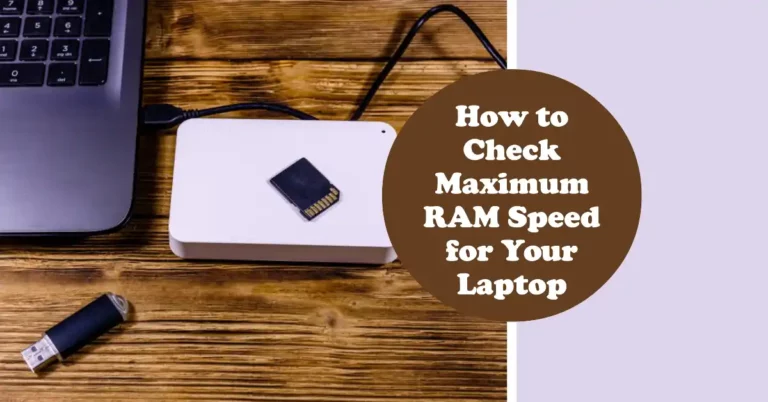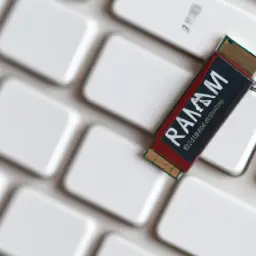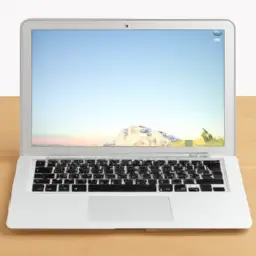Does 16gb Ram Increase Fps?
Ram doesn’t directly affect fps, so it doesn’t really matter whether if you have 8gb or 16gb of ram in your laptop or computer.
In this article, we’ll explore whether 16GB RAM can boost your FPS and how much it could potentially improve your gaming experience. We’ll look at what RAM does for gaming as well as some other tips for getting the most out of your system. So if you’re looking to get an edge in your games, read on and find out if 16GB RAM could be the answer!
Finally, we’ll discuss whether 16GB RAM is worth the investment or if there are better ways to spend your money. With all this information, you can make an informed decision about how best to upgrade your gaming setup and take advantage of every ounce of performance potential. So let’s dive in and see if 16GB RAM can really help increase FPS!
How Ram Affects Fps
The first thing to consider is how much RAM you have. Generally speaking, having more RAM will improve your computer’s performance, as it gives your PC more chances to store information, resulting in faster loading times and smoother frame rates.
However, if your system already has enough RAM for your particular needs, then adding more won’t do anything to increase your FPS.
The second factor to consider is the type of RAM that you have installed on your system.
Different types of RAM can perform differently depending on factors such as memory speed and latency.
For example, if you’re looking for a boost in gaming performance, then installing faster DDR4 memory modules could provide a noticeable increase in frames per second compared to using older DDR3 modules.
Ultimately, the amount and type of RAM you choose for your system can affect the performance gains that you’ll get from upgrading or adding more memory.
Benchmarking Ram For Fps
It’s essential to understand how to measure your RAM’s performance in order to see if it is capable of giving you an upgrade in terms of FPS.
The best way to do this is to use benchmarking software like 3D Mark or PassMark Performance Test.
This software can accurately measure your RAM’s performance and give you insight into whether or not your RAM is performing at its optimum level.
Another factor you should consider before upgrading your RAM is the type of graphics card you have installed on your computer.
If your graphics card doesn’t support high-end gaming, then adding more RAM won’t necessarily increase your FPS as much as upgrading your graphics card would.
So make sure that when shopping for a new GPU, you also take into account any potential increase in performance that extra RAM might provide.
In short, benchmarking your RAM for FPS is important if you want to get the most out of your gaming experience.
It’s vital to understand what type of memory you have installed, as well as the capabilities of both your CPU and GPU before making any upgrades.
With the right information, it’s possible to gain an edge over other gamers with improved FPS performance from upgraded memory components.
Factors That Affect Fps
When it comes to gaming, frame rate (FPS) is a major point of consideration.
FPS determines the smoothness and clarity of animations, making it an important factor for gamers.
First of all, graphics hardware can have a big impact on FPS. Graphics cards are designed specifically for gaming and usually come with more powerful chips than regular ones.
This can greatly improve performance, allowing for higher frame rates in games.
Additionally, certain settings in-game can affect performance as well.
Some games may require higher graphics settings to run effectively which can affect FPS negatively if your system is not equipped to handle them.
Aside from graphics hardware and settings, RAM also plays an important role in determining FPS.
More RAM allows you to store more data on the system’s memory which helps reduce lag and improve performance overall.
However, while 16GB of RAM can make a difference in some cases, it is not always necessary for an increase in FPS since other factors such as graphics hardware and settings can also be important considerations when trying to boost your frame rate.
In short, different components and settings play key roles when it comes to achieving higher frame rates in video games.
Graphics hardware and game settings should be taken into account when trying to improve performance on your PC or console; however, RAM can also contribute significantly depending on the game you are playing and the specs that your computer has.
16gb Ram Vs Other Ram Sizes
The previous heading looked at the different factors that could influence a PC’s Frames Per Second (FPS). Now, let’s take a closer look at the specific impact of RAM size.
It’s well known that RAM size can be a major determinant of FPS in gaming. There are various sizes available, with 16GB being among the highest.
It stands to reason that this would have the most dramatic effect on FPS levels – but is it really true?
The fact is, having 16GB RAM won’t necessarily give you an instant boost in performance.
It might help to smooth out stutters and lags, but it won’t directly translate into higher frame rates. It also depends on what kind of game you’re playing and how much RAM your graphics card requires for optimal performance.
When it comes to choosing a RAM size for gaming, it’s important to consider both your budget and your needs.
If you’re playing more graphically-intensive games or running multiple programs at once, then 16GB may be a good choice for you.
However, if you’re mostly playing less demanding titles or don’t need extra multitasking power, then 8GB or 12GB could be enough.
Summary Of 16gb Ram And Fps
When it comes to RAM, more is better, as having more RAM allows you to store more data on your computer while running applications like games.
Generally speaking, more RAM means faster speeds and better performance. However, if you don’t have a good graphics card or processor, then adding extra RAM won’t make much difference in terms of FPS.
So what can we conclude from this? Well, while 16GB of RAM will certainly help improve your gaming performance in some cases, it’s not necessarily essential for having a good gaming experience.
Ultimately, it really depends on the type of games you’re playing and how powerful your system is – if you have an older system with lower specs then adding extra RAM might not be worth it.
On the other hand, if you’re looking for a competitive edge in online multiplayer games or high-end AAA titles then 16GB could give you that boost you need.
Overall, there’s no definitive answer; whether or not 16GB of RAM will increase your FPS depends on multiple factors such as the type of game being played and hardware specifications.
But one thing remains clear: having additional memory can only help improve your gaming experience in certain scenarios.
Frequently Asked Questions
Is There A Difference In Performance Between 16gb Ram And 32gb Ram?
When it comes to gaming, RAM is one of the most important components that can affect performance. Many people ask if there is a difference in performance between 16GB and 32GB RAM. After all, more RAM should mean better performance, right?
In order to answer this question, we need to look at how RAM works and its implications for gaming. Generally speaking, having more RAM means you can store more data in the system memory at one time. This can have a positive effect on your gaming performance by allowing your system to access data faster and reducing loading times. Additionally, more RAM allows you to multitask more efficiently while playing games since it reduces the amount of swapping between disk and main memory.
However, when it comes to gaming specifically, the difference between 16GB and 32GB of RAM may not be that significant. This is because most modern games don’t require large amounts of RAM in order to run properly – 8GB is usually enough for most titles today. So if you’re looking for an upgrade that will provide you with tangible in-game improvements, you might want to focus on other hardware such as your graphics card or processor instead.
In short, while having 16GB or 32GB of RAM may help improve overall system performance and reduce loading times, it won’t necessarily have a noticeable impact on FPS during gameplay.
Can 16gb Ram Improve The Performance Of Older Games?
When it comes to gaming, many players often wonder if they can improve their performance in older games by upgrading their RAM. Specifically, they might be wondering if 16GB of RAM will make a difference. The answer is yes – 16GB of RAM can help improve the performance of older games.
When playing older games, having more RAM can help increase frame rates and boost overall performance. That’s because modern graphics cards often require larger amounts of memory than what was available when the game was released. With more memory available, the game runs smoother and faster.
However, there are some things to consider before investing in a new RAM upgrade for your PC. First, you need to make sure that your processor is capable of handling the extra memory load from the upgrade. Also, you should check to see if your motherboard supports 16GB of RAM before purchasing it. Another factor to consider is that some games may not benefit from additional RAM beyond 8GB or 12GB due to certain limitations in the game engine itself.
Is There A Noticeable Difference Between Single-Channel And Dual-Channel Ram?
Increasing RAM is an important factor when it comes to optimizing gaming performance. One of the most common questions people ask is whether there’s a noticeable difference between single-channel and dual-channel RAM. To answer this question, let’s take a closer look at what these two types of memory mean and how they affect gaming performance.
Single-channel RAM, also known as SDRAM, is a type of memory that uses one data stream from one memory chip. This means that data can only be processed in one direction at once. On the other hand, dual-channel RAM utilizes two data streams from two separate chips. This allows data to be processed in both directions simultaneously, which translates into faster speeds and improved performance.
When it comes to gaming, dual-channel RAM is usually the better option because it can help improve frame rates by up to 10%. While this may not seem like much at first glance, it can make a huge difference in certain games where frame rates are particularly important. Additionally, dual-channel RAM can help reduce stuttering and lag due to its increased speed capabilities.
Can 16gb Ram Be Upgraded To 32gb Ram?
When it comes to RAM, the amount of memory you have can significantly impact your computing performance. Many users are wondering if 16GB RAM can be upgraded to 32GB. The answer is yes, in most cases, 16GB RAM can be upgraded to 32GB.
Before upgrading your RAM, it’s important to make sure that your motherboard and processor support this type of upgrade. If they do, then you should be able to use the same type of RAM for the additional 16GB – either DDR4 or DDR3. This will ensure a smooth transition and an improved overall performance from your system.
The upgrade process itself is relatively straightforward: simply remove the existing 16GB of RAM from your motherboard and replace it with the new 32GB module(s). Once done, you’ll notice an immediate increase in speed and more efficient multitasking capabilities. With 32GB of RAM installed, you’ll also be able to enjoy smoother gaming experiences as well as quicker loading times when working with large files or programs.



